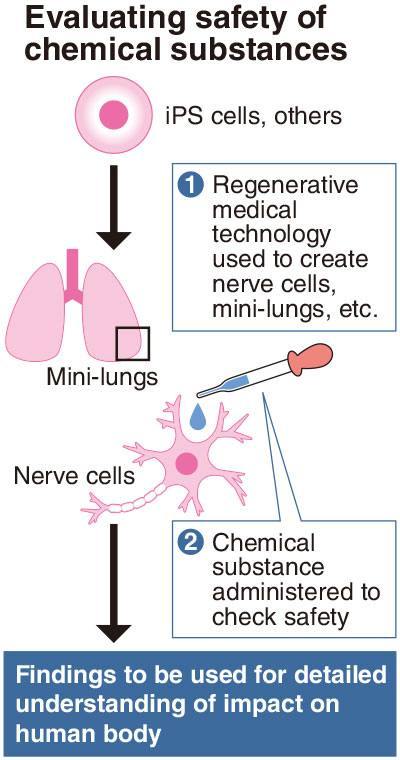
The building housing the Health, Labor and Welfare Ministry is seen in Tokyo.
2:00 JST, December 5, 2022
Human cells and miniaturized organs known as “organoids” developed from induced pluripotent stem (iPS) cells will be used to develop a new method to test whether certain chemical substances are harmful to the human body, The Yomiuri Shimbun has learned.
The Health, Labor and Welfare Ministry is hoping to make the method an international standard, according to sources. It intends to promote worldwide the utility of Japan’s regenerative medical technology, and to foster new industries such as the mass production of miniaturized organs.
Organoids are created by culturing cells in vitro to grow in a three-dimensional form, reproducing a structure and some functions similar to those of human organs. Versions of most human organs have been successfully created, including the brain, heart, lungs and liver.

The technology is expected to be applied to regenerative medicine and the discovery of new drugs.
Regenerative medical technologies, such as iPS cells and organoids, can create an environment close to that of human organs and tissues. Research to create such cells and confirm the effects of candidate drugs has progressed at Kyoto University and the Tokyo-based National Center for Child Health and Development, among other institutions.
The health ministry intends to use this technology, in which Japan has an advantage, to develop a new method to check the safety of chemical substances used to manufacture industrial products. A research team of experts will be set up next fiscal year to verify the effectiveness of the method over about three years, according to the sources.
The team will create nerve cells and miniaturized lungs measured in millimeters that have been derived from human iPS cells, and then evaluate whether chemicals affect nerves and look into how the organoids change after absorbing chemical substances.
The use of human-derived cells and miniaturized organs is expected to make it easier to verify the detailed effects on the human body, compared to conventional experiments using mice and other animals.
The new method could provide an alternative to animal testing and reduce the burden of maintaining breeding facilities, thereby improving the overall efficiency of evaluation operations.
As the new method does not use living organisms, it will also be in line with the international trend to reduce animal experiments. The ministry therefore plans to propose this method to the Organization for Economic Cooperation and Development, which sets international standards for evaluation manuals, to promote its use in other countries, the sources said.
Top Articles in Society
-

Producer Behind Pop Group XG Arrested for Cocaine Possession
-

Man Infected with Measles Reportedly Dined at Restaurant in Tokyo Station
-

Man Infected with Measles May Have Come in Contact with Many People in Tokyo, Went to Store, Restaurant Around When Symptoms Emerged
-

Woman with Measles Visited Hospital in Tokyo Multiple Times Before Being Diagnosed with Disease
-

Australian Woman Dies After Mishap on Ski Lift in Nagano Prefecture
JN ACCESS RANKING
-

Producer Behind Pop Group XG Arrested for Cocaine Possession
-

Japan PM Takaichi’s Cabinet Resigns en Masse
-

Man Infected with Measles Reportedly Dined at Restaurant in Tokyo Station
-

Israeli Ambassador to Japan Speaks about Japan’s Role in the Reconstruction of Gaza
-

Videos Plagiarized, Reposted with False Subtitles Claiming ‘Ryukyu Belongs to China’; Anti-China False Information Also Posted in Japan


















